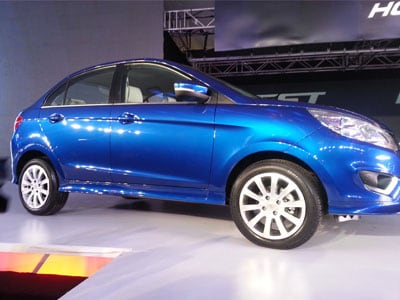
Tata Motors today unveiled its first new models in four years on Monday, banking on two small cars to reverse the company's sliding passenger car sales in the face of growing foreign competition.
Sales of Tata passenger vehicles in India fell an annual 37 per cent in the first nine months of the fiscal year that ends in March, according to data from Society of Indian Automobile Manufacturers (SIAM), the steepest drop in an ailing industry headed for a second straight year of declining sales.
Rising interest rates and high fuel costs in Asia's third-largest economy, growing at its slowest pace in a decade, have pushed consumers to delay the purchase of big ticket items.
In a bid to revive its fortunes, Tata is pinning its hopes for now on the all-new Bolt hatchback and Zest entry-level sedan (pictured here below) to tap into the small car market that accounts for the bulk of passenger vehicle sales in India.

Last year, many of Tata Motors rivals launched a number of popular models, including Honda Motor with its entry-level sedan Amaze and Hyundai Motor Grand i10 hatchback. Tata, meanwhile, only tweaked and refreshed existing models.
Small cars are top sellers in a country where most people prefer to drive cheaper, fuel-efficient compact cars as roads are clogged with traffic and parking in big cities is hard to come by.
Tata will showcase the Bolt and Zest, to be made at its Pune factory, at the Indian auto expo that starts on Wednesday.
"Clearly the compact sedan and the hatch present the biggest opportunity from a market standpoint," said Ankush Arora, Tata Motors' senior vice president and head of the commercial-passenger vehicle business unit, said on Monday.
Over the last two years, Tata has relied on strong performance at its luxury Jaguar Land Rover unit to offset weak sales at home, where it is losing market share to Hyundai Motor, Maruti Suzuki and others.
FRESH DESIGNS NEEDED
Monday's unveiling of the new Tata cars came just over a week after Karl Slym, who was the company's managing director, died after falling from the 22nd floor of a Bangkok hotel, in what police said may have been suicide.
The cars would have been the first new passenger vehicles to be launched under the leadership of Slym, who joined Tata in October 2012 and was tasked with reversing the sales slump.
While his death has caused worries about potential delays to the company's turnaround plans, Tata Motors has said it has a pipeline of products through the next six years.
"What Tata Motors really needs is fresh designs. So far it has been depending on slight changes and model extensions," said Anil Sharma, an analyst with IHS Automotive.
"It doesn't matter which model or what segment they are targeting. It's absolutely critical for them to start somewhere and this is a positive move for them."
The company has not launched an all-new Tata-branded passenger vehicle since its Aria crossover in 2010.
Last month, it unveiled the first variant from its new series of petrol engines, which will power some of its future cars, including the Bolt and Zest. Most of Tata's passenger vehicle sales are for diesel-powered models.
Tata Motors, India's largest maker of trucks and buses, has been posting losses in its domestic operations for the last few quarters, but strong JLR sales have rescued it.
Essential Business Intelligence, Continuous LIVE TV, Sharp Market Insights, Practical Personal Finance Advice and Latest Stories — On NDTV Profit.























